Why Wouldn’t Everyone Love Lucy?
Lucille Ball changed the way women were viewed on radio, in the late 1940s, and then in the 1950s with her television debut of the I Love Lucy show. Ball broke many stereotypes of the 1950s, an era when many thought women belonged exclusively at home making dinner and raising children, on-screen and off. This article will explore the many ways that Ball had left her indelible mark on television. For instance, I Love Lucy was the first television show to use a live audience, the first multi-camera filmed sitcom, Lucy and Ricky Ricardo were television’s first interracial couple, Lucy was the first woman to be “expecting,” on a 1950s television show, Lucy and Ethel’s “homosocial” relationship was innovative for the time, and finally the creation of Desilu Productions made Lucille Ball the first woman to be the head of a Hollywood studio.
How it all Began
I Love Lucy was based on a radio show, My Favorite Husband, that Lucille Ball had made popular in 1948 to 1951 and was aired by CBS (Lucy-Desi Center). Ball wanted her husband, Desi Arnaz, to play her husband on the I Love Lucy show. CBS was reluctant to hire Arnaz. The executives at CBS were unsure how well received the audience would be to having a Cuban man married to an American woman. CBS wanted Ball so badly that they gave in. Ball got her way and Arnaz became her husband on the sitcom (VanDerWerff).
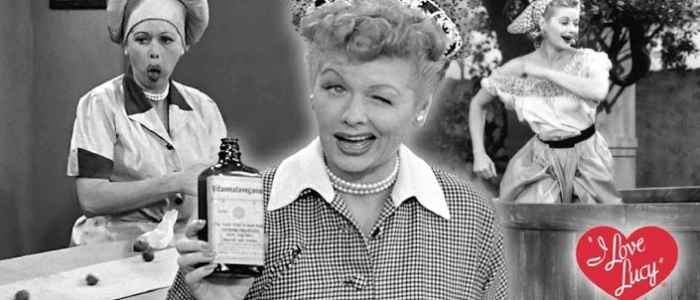
History was made on October 15, 1951 when the first episode of I love Lucy aired. It wasn’t technically the first episode of I Love Lucy. The show’s pilot was recorded on kinescope. The product of kinescope was often distorted or fuzzy. CBS and the show’s sponsor Phillip Morris, the cigarette company, wanted the show to be filmed on the East Coast, while Ball and Arnaz wanted to stay in L.A. where they had called home for several years.
As necessity is always being the mother of invention, Arnaz called in Karl Freund, one of the best cinematographer’s in the business to work on the project of changing kinescope (16mm) to 35mm film using a multi-camera set of four cameras the first season. Arnaz also brought in a live studio audience versus canned laughter to make the show authentic during the taping of the show, again making television history. CBS allowed them to stay in L.A., but complained about the cost of the new shooting, so Ball and Arnaz took a pay reduction and CBS agreed that after the shows would air, Ball and Arnaz would have the ownership of the shows, which helped make Desilu Productions the most powerful independent television company (Elrick). Ball was determined to work with her husband Arnaz, and knew she would win over the CBS executives. Ball’s personality was quite atypical for her time, even for a starlet.
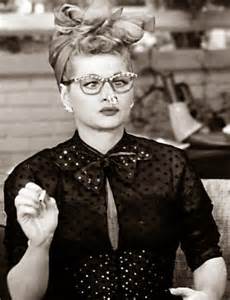 So how was the female gender being portrayed on the new genre television in the late 1940s and throughout the 1950s? According to Wolf, with the media growing at 5 million televisions sold each year in the 1950s, messages in advertising and programming were direct and indirect. The woman was the central part of the nuclear family that represented the United States. Besides taking care of the husband, the woman of the 1950s focus all of her attention to the children and the happiness of the family. This stereotyping crossed all racial, ethnic, and social class lines in 1950s television shows (28). To think Lucy Ricardo was out for her own personal gain because she wanted her shot at show business so badly, and would get into so much trouble for trying to steal the spotlight, just goes to show how I Love Lucy broke the female gender boundaries.
So how was the female gender being portrayed on the new genre television in the late 1940s and throughout the 1950s? According to Wolf, with the media growing at 5 million televisions sold each year in the 1950s, messages in advertising and programming were direct and indirect. The woman was the central part of the nuclear family that represented the United States. Besides taking care of the husband, the woman of the 1950s focus all of her attention to the children and the happiness of the family. This stereotyping crossed all racial, ethnic, and social class lines in 1950s television shows (28). To think Lucy Ricardo was out for her own personal gain because she wanted her shot at show business so badly, and would get into so much trouble for trying to steal the spotlight, just goes to show how I Love Lucy broke the female gender boundaries.
Is She? Or Isn’t She? OMG She IS!
“Lucy is Enceinte” is the title of the show with Lucy trying to tell Ricky that she’s . . . expecting. NOT pregnant, that was an immoral act in the early 1950s. People didn’t do those things, and especially not Lucy and Ricky Ricardo. They slept in twin beds. CBS would not let the show use the word pregnant, and as obnoxious and prudish as CBS was about Ball being pregnant and writing the pregnancy into the script, the episode was as touching and loving as one could be and the American audience thought so too. There were five episodes in between “Lucy with Child” and “Lucy goes to the Hospital,” seven episodes in total that represented a real-time pregnancy and have been depicted on television. This, not only was a first to be done on television, but few real-time pregnancies had been depicted on television since. The episode “Lucy goes to the Hospital” had 44 million viewers. Perhaps the only ones not ready for Lucy to be pregnant on television were the CBS executives (Koski).
The Dynamic Duo

Unlike most of popular culture of the 1950s, where women were mostly seen together to fight over a man, Lucy Ricardo and Ethel Mertz showed the value of female friendship, similar to the female duets of the 1950s musicals. Although Lucy and Ethel were homemakers of the 1950’s who had to answer to their husbands, that would not stop the special connection the between the two women (Wolf 29). In the show, Lucy and Ethel are best friends. Ethel and her husband, Fred, are Lucy and Ricky’s landlords. In many episodes, the women are scheming against the men and vise-versa. Lucy and Ethel draw strength from one another, not to mention the hilarious antics the two of them pulled off or tried to pull off. Often, the duo would break out into a song and dance; although, they were not mimicking Broadway musicals, as much as Vaudeville, because Ethel and Fred boasted on more than one occasion that they were once a Vaudeville act. The connection that Lucy and Ethel had was magical and once again, Ball broke out of the stereotypical housewife role and had the craziest friendship ever with her best friend.
Desilu Productions
So how and when did Desilu Productions come to be? The very first show, the pilot for I Love Lucy, was created by Ball and Arnaz in kinescope after they used their own money, $5,000, to create Desilu Productions. The pilot enabled Ball to convince CBS to hire Arnaz as her husband on the show. When CBS gave Desilu Productions the rights to the shows after airing, and because of the show’s popularity, the couple created the re-run and syndication. Needing more money to expand Desilu Productions, Arnaz sold back the first 180 episodes of I Love Lucy to CBS for $5 million. Desilu Productions then bought RKO Studios, where many television shows were produced, including The Dick Van Dyke and Andy Griffith shows(entrepreneur).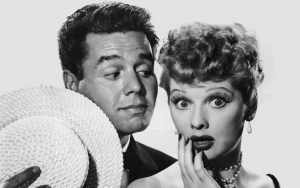
Beginning of the End
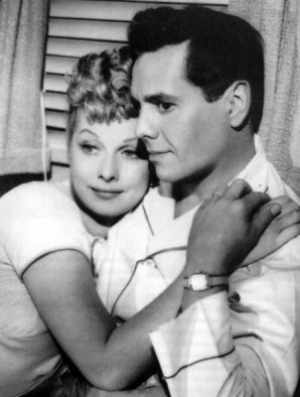 Their marriage had rocky times and there were rumors about Arnaz with other women and drinking early in their marriage. Ball and Arnaz wanted to work together so they created Desilu Productions. Working together seemed to be the right choice as they had two children while taping the show. However, the pressure of running the Studio and working on the set caused Arnaz to drink more heavily. The couple were having many arguments towards the end of the show’s run. Arnaz and Ball divorced in 1960, Ball remarried in 1961 and was starring in another show, The Lucy Show, which Arnaz was directing. The stress became too much for Arnaz and he asked Ball to buy him out(entrepreneur).
Their marriage had rocky times and there were rumors about Arnaz with other women and drinking early in their marriage. Ball and Arnaz wanted to work together so they created Desilu Productions. Working together seemed to be the right choice as they had two children while taping the show. However, the pressure of running the Studio and working on the set caused Arnaz to drink more heavily. The couple were having many arguments towards the end of the show’s run. Arnaz and Ball divorced in 1960, Ball remarried in 1961 and was starring in another show, The Lucy Show, which Arnaz was directing. The stress became too much for Arnaz and he asked Ball to buy him out(entrepreneur).
That’s Ms. CEO to You
Ball bought Arnaz out for $2.5 million and became the first woman CEO of a major production movie and television company. Although the business wasn’t doing so well, Ball hired a CBS executive, Oskar Katz, to be her executive vice president. Ball and Katz went on with Desilu Productions and programs such as Star Trek and Mission Impossible were produced. Ball sold Desilu, in 1967, to Paramount for $17 million (entrepreneur). Again, Ball changed a societal role and became the first woman CEO of a major production company.
Lucille Ball and Desi Arnaz were incredibly business savvy to have taken their own money to create their own production company. This gave the couple much more creative freedom than being owned by a network. CBS couldn’t really tell Desilu Productions not to write Ball’s pregnancy into the script (just don’t dare call yourself pregnant). What came out of their creation did so much for this new medium of television as we know it today. Ball and Arnaz created re-runs and syndication by filming the I Love Lucy show. How brilliant that Desilu sold the first 180 episodes back to CBS for $5 million, and when Desilu would film I Love Lucy they would rent the equipment that they originally purchased from CBS back to CBS to film each episode.
Had the I Love Lucy show not been created in the 1950s, it could have been created in a recent decade. I Love Lucy was defiant of convention as was the character Lucy, together they took on social issues that even today would be considered bold and daring. There still aren’t many interracial couples represented on television today, and the networks still hide pregnant actresses behind objects and in big , baggy clothes. The I Love Lucy show was groundbreaking in the 1950s ,and would be groundbreaking had it been created 65 years later.
Lucille Ball (and the love of her life, Desi Arnaz) created a show that just wasn’t an ordinary 1950s comedy, it will always be around with timeless, slapstick humor that should tickle anyone’s funny bone, but perhaps the most important legacy about the show was all the “FIRSTS” that came from the bravery of this feminist, in a time when feminine strength and savvy were almost unheard of. Kudos to you, Ms. Ball.
Work Cited
Elrick, Ted, Director’s Guild of America, July 2003, n.p. Nov. 25, 2016,
Desi Arnaz and Lucille Ball, entrepreneur, n.d., n.p., Web. Nov. 26, 2016
Koski, Genevieve, AV Club, Lucy is Enciente, July 24,2013, n.p., November 23, 2016 Web.
Lucy Desi Center for Comedy, Jamestown, NY n.d. Nov.1,2016, Web. lucy-desi.com
VanDerWerff, Todd, AV Club, I Love Lucy endures after all these years, April 9,2012, n.p., November 25, 2016 Web. avclub.com
Wolf, Stacy. Changed for Good. New York: Oxford University Press, 2011. Print.
What do you think? Leave a comment.
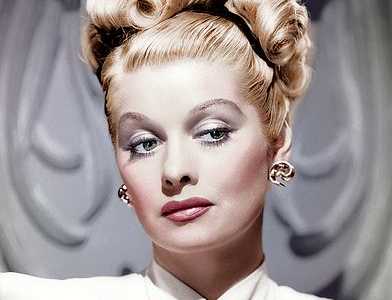











This might be an old black and white TV series from the 1950s, but it has definitely stood well through the test of times.
I think it is interesting how she couldn’t say the word pregnant. That reminds me of I dream of Genie how she couldn’t show her bellybutton. Now it feels like there is so much going on TV that people have to censor it for their children
I used to watch the show all the time as a kid, back in the 90s, but haven’t seen it in at least a decade. The comedy is pretty broad and obvious, which is perfect for a youngster but gets repetitive quickly and makes you want to watch some higher-brow comedy.
Surprising this topic had not been written about before. Lucy was an absolute force of nature and opened so many doors in television, many of which were directly for women. It is a bit strange and funny when people fail to realize that so many sitcoms (e.g. Seinfeld, Friends, The Big Bang Theory, etc.) closely follow the brilliant TV formula developed by ” I Love Lucy.”
I was watching the show for the first time when it was a rerun many times! I agree that Lucille Ball left an indelible mark on television comedy as we know it today, and without Ball and Arnaz’s genius we wouldn’t have the quality of television comedies as we do today. Thank you.
It is really interesting to see how a pregnancy was such a big deal a few decades ago and now there is a whole rather problematic appeal to highlight pregnancy stories in the most ridiculous ways – e.g. in Fringe, Prometheus, etc.
It’s so funny to me to think back to when this show was actually created because watching it when I was younger, I never even noticed all the things Ball and Arnaz were doing that weren’t the societal norm. Now that I’ve gotten older and have seen the boundaries placed on women, it’s easier for me to see how great the show actually is.
Let’s grab a moment to salute and pay honour to director William Asher who was the one responsible for knowing exactly how to handle the script-material given to him and then mould the actors perfectly into the characters which they inevitably became.
Yes, thank you Asher was a genius. As I was doing the research for the paper I found out that Ball had brought over her writers from the radio show, “My Favorite Husband,” and Ball attributed much of the success of the show to their great writing as well.
Great retrospective! I have now seen every single episode from all 6 seasons of the “I Love Lucy” TV show from the 1950s. And, by far, I rate Season 4 as being the absolute best season of them all.
I grew up in the 70s, this show aired in the 50s but it was still running in reruns when I used to watch TV as a kid. I saw a fair bit of it and I was never impressed. The physical humor didn’t do it for me. (Lucy had talent but she was no Charlie Chaplin or Groucho Marks in the comedy scale). I found the show, while growing up, tedius and boring.
As an adult, I can respect it more for what it meant to history but growing up it was among my least favorite shows. I realize now that much of the humor was geared towards adult/married audiences who might enjoy the marriage troubles so it was never really a kids show, the way much of television was.
I also don’t think it’s timeless, I think it’s dated. It’s history, but it’s not timeless.
Interesting insider’s viewpoint.
I’ve really enjoyed your piece this 1950s sitcoms.
I Love Lucy – like Father Knows Best, the Dick Van Dyke show, and other 1950’s and early 1960’s era TV, reflected the values of a healthy society. That society belongs to the history books now.
I’ve never thought about Lucy and Ethel as innovative before! Just think, without Lucy and Ethel, we might not have Rachel and Monica on Friends and definitely no Sex and the City or Girls!
This was the sitcom of sitcoms, and in a way, it still is. Every aspect of the show’s premise was implausible and innovative.
It has a great combination of just the right amount of witty humor and slapstick comedy!
You all made some great points! What is there not to love about Lucy.
I was wondering what you thought about the fact that many of these shows recognize gender stereotypes to begin with. While some of the creative artists may have wanted to challenge gender norms even further, most likely the production heads, sponsors, and networks did not want to touch such “controversial” issues. Especially with a show like I Love Lucy.
This article was great! I admittedly have only seen I Love Lucy a few times, but your examination of this 1950s show’s rebellious “firsts” was a good read. The “expecting” (rather than pregnancy) topic made me think not only of how representations of pregnancy abound in modern American TV, but the wide spectrum of representations and subsequent appeals to the viewing public. On the one hand there’s the slew of reality shows that focus on pregnancy, often teen pregnancy–on the other are (arguably) heart-wrenching representations such as Lori’s in The Walking Dead. That the latter is not only acceptable today but adds an emotional, tragic dimension between several characters, shows just one way in which representations of pregnancy in television has grown and gained depth since trailblazers such as I Love Lucy, as you examine it.
What a great read. This is such an important topic to discuss. Lucille Ball was a renegade and pioneer. Kudos, indeed, to Ms. Ball.
In the 1970s and ’80s I wasn’t a Lucy fan. I realized her talent, but I resented her portrayal of a “ditzy” housewife. Over the years, I have come appreciate the significance of her contributions to our industry and our culture, but never more than now after reading your article. Nicely done.
Wasn’t Mary Pickford the first female owner of a production company?
For nostalgics and idealists!
I think it tells us a lot about the attitudes in the 50’s. A lot of people didn’t want change, didn’t want equality compared to now where the majority of people do.
I can certainly respect Lucy for her comedic talent, and even her acting ability. I was never a big I Love Lucy fan though, simply for the fact that I found the character to be manipulative, scheming, self-centered, self-absorbed, and she really didn’t care who she hurt or in what ways just so that she could have her way in a situation. I know this isn’t a popular opinion, but I feel that it is valid. I fell that her character was very negatively portrayed. I reiterate, the character, not Miss Ball. She was a talented actress and comedian – just don’t let her sing.
I think that this t.v show does an excellent job of portraying with the 50’s really looked liked.
She chose to take on the issue of race which I love about her. In the 1950’s and before that decade, racism was acceptable. In fact a person who was not racist was in the minority. Lucille Ball was a product of her time. She was born in an all white community in 1911 and grew up socializing with nothing but white people. Few people socialized outside their ethnic group then – so they went through life with ignorant ideas about people different from themselves.
One point that is interesting is that as Lucy can be considered one of the founding women of comedy. She was able to break through the barriers of race, gender, etc through her talent as a comic.
Love this!
Such a classic show and one classy lady. love lucy!
i love lucy, so much!
Same! She is so funny
She will always be a classic and one of the bests in the business in my opinion. There will never be another Lucy.
Lucy! You got some ‘splainin’ to do!
I grew up watching I Love Lucy, even though it was an earlier 1900’s show, it was cool find out things i didn’t already know about the show. It really did make history. I’m curious to know if they still have the Lucille Ball exhibit at Disney World.
It’s so interesting in how far we’ve come on what we “allow” on TV today. Though I wish in a way it would go back to the Lucy days. Things just seemed simpler.
Ok now I love Lucy was such a funny show when Lucy was working on the conveyer belt and she accidentally bumped into it and it went faster then she had to keep up with it and it just went faster and faster that was the funniest show I’ve ever seen in my life LOL!!
I loved this essay! Great documentation.
Interesting read.
Glad to see your article up. Lucille Ball was such a master of slapstick comedy. As you so deftly point out, she was also a real trailblazer for women in the industry. Even though I’m not part of the generation that grew up watching her when the show originally aired, I still grew up watching plenty of reruns. There aren’t many sitcoms where I end up in fits of gut-busting laughter, but I Love Lucy is definitely one of the exceptions.
What a lady and inspiration to women even today. Lucille Ball had a vision and was not afraid to see it through.
I grew up watching I Love Lucy because my mum and grandmother were such big fans. The jokes are still current and the social commentary is spot on. If there is a re-run on TV, I will still grab a snack and jump on the couch to watch!
Me too, and although I have seen each episode hundreds of times the show still makes me laugh out loud!
While today we have cult favorite shows, none closes shops early. I am always amazed the power this show had over viewers.
This was wonderful to read. We need more feminist characters on television today!
Jerry Hausner doesn’t remember his days working on “I Love Lucy” as happy ones, but then, he didn’t expect them to be.
“You don’t think in terms of whether you’re happy or not when you’re doing it,” Hausner says. “You’re making a living.”Hausner played Ricky Ricardo’s agent, Jerry, on many episodes of the champion warhorse and on the “I Love Lucy” pilot film – made in March, 1951, long thought lost, and recently aired for the first time ever by CBS.
Wow, I love this article.
What struck me most about Lucille Ball was her persistence with dealing with CBS execs. I Love Lucy was a comedic sitcom with a female as the main character who made mistakes. How rare is that in 2017? It seems like every September we are introduced to comedy sitcoms on NBC, CBS, etc. that are cancelled as quick as they started. Yet, most of them are centered around a white male.
Lucy eventually created the show that she wanted, with her husband on the west coast. Even those details rarely happen today. The television industry is so different today that you have people creating their own pilots and finding companies like Netflix and Hulu to financially support you. I can’t imagine anyone that would fight with a multi-million dollar company like CBS, today.
Lucy’s business-minded attitude should be an inspiration for any young creator, especially a female.
A thought-provoking article, especially the part that discusses Lucy being ah, ahem, “enceinte.” I loved how CBS chose to show a “real time pregnancy” over the course of about seven episodes. These days, a female protagonist can announce a pregnancy one week and the next week, look like she’s going to pop any second. And let’s not even get going on the fact that until very recently, sitcom pregnancies were portrayed as clean, fairly pretty, and fairly easy. When a character goes into labor, I expect to see her swollen and sweating (and possibly telling her husband off for noshing on a burger while she’s allowed nothing but ice chips)! 🙂
Enjoyable to read. I remember when it was on originally–not in reruns. The birth of Ricky Junior was really a big deal, which when looked at from the present seems almost absurd.
I am a huge Lucy fan. Lucille Ball lived with severe arthritis yet still became a brilliant physical comic. What I hate is that in two episodes Ricky spanked Lucy on her behind! Why did the show approve spousal abuse?